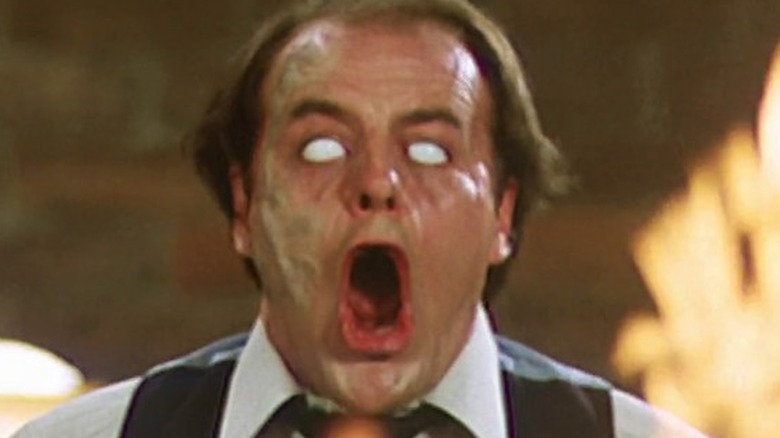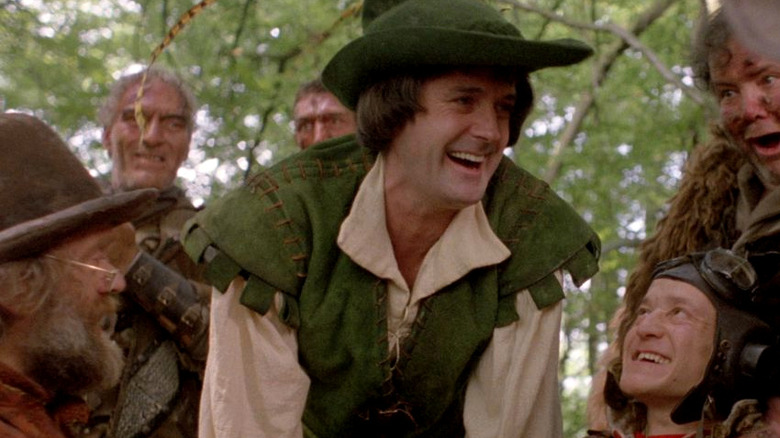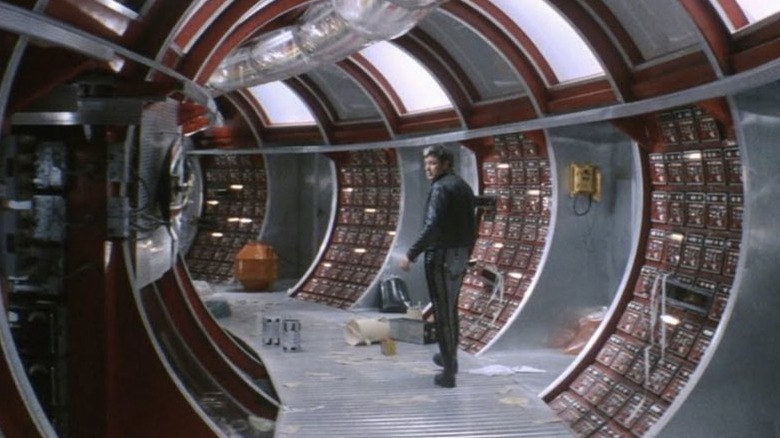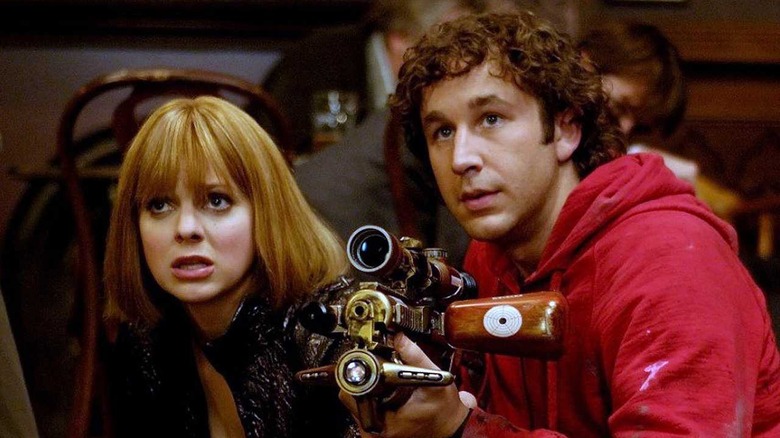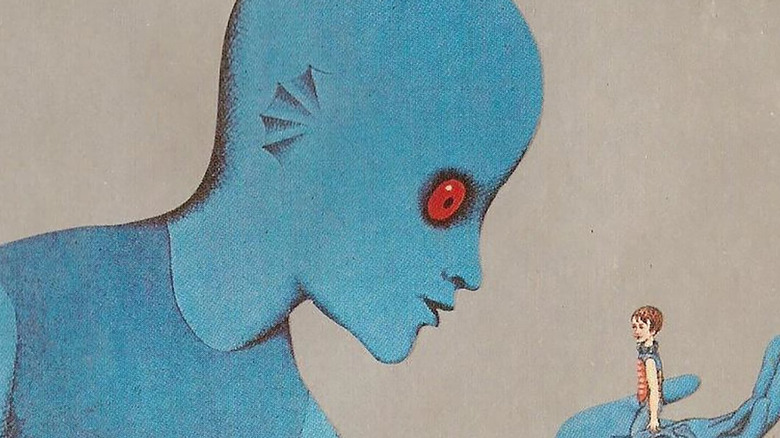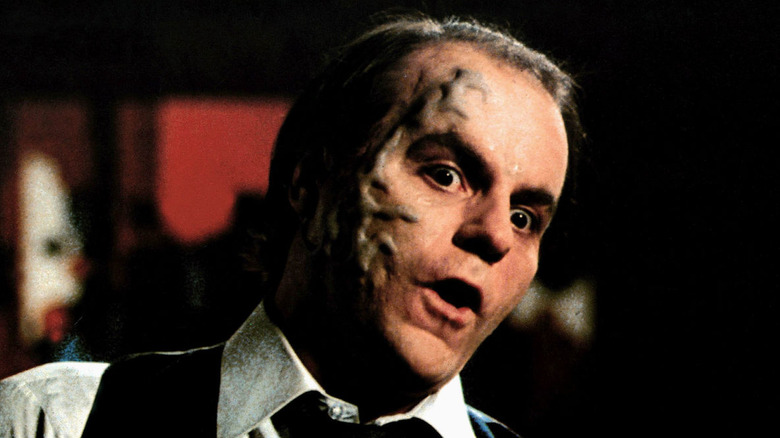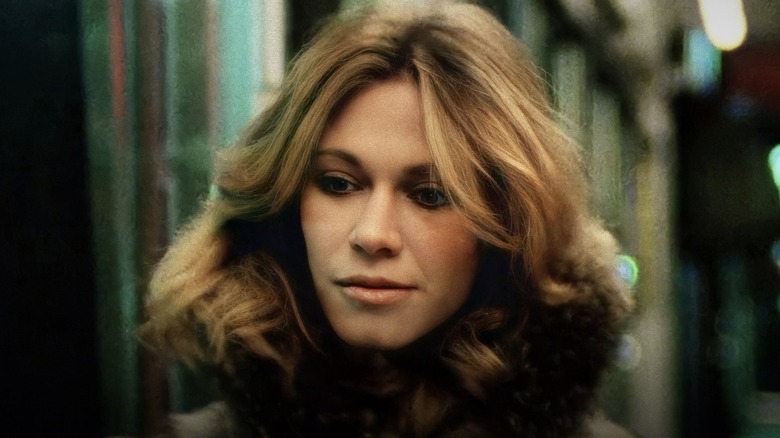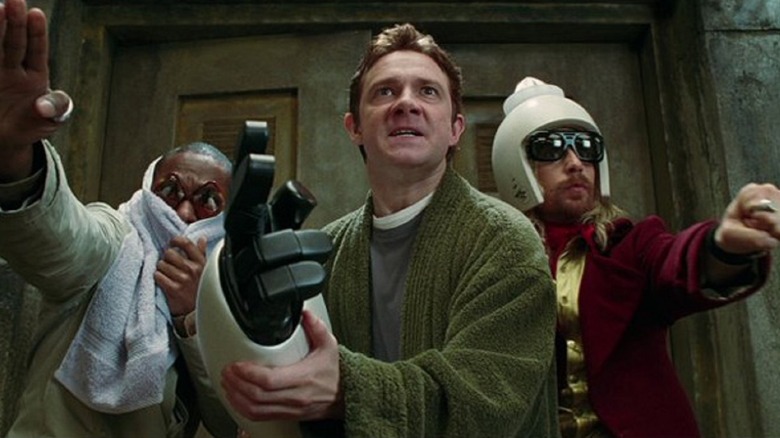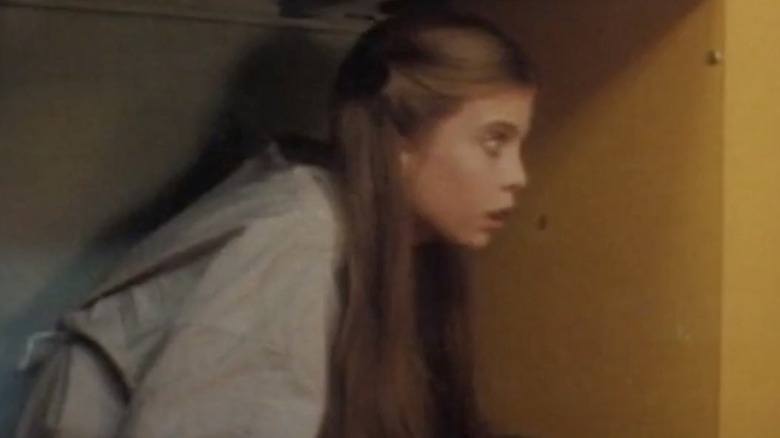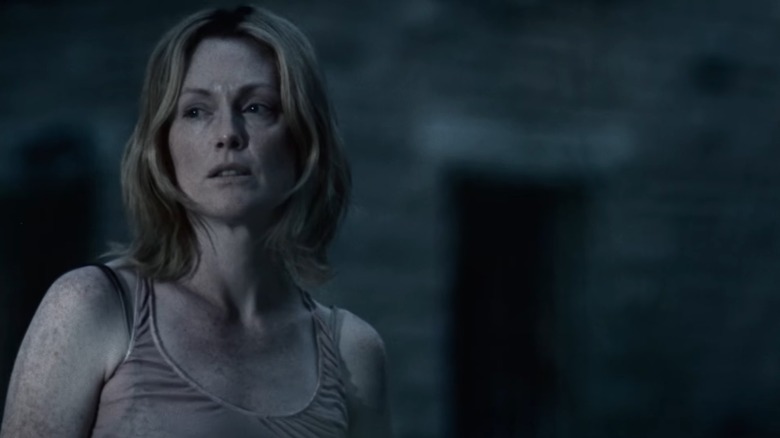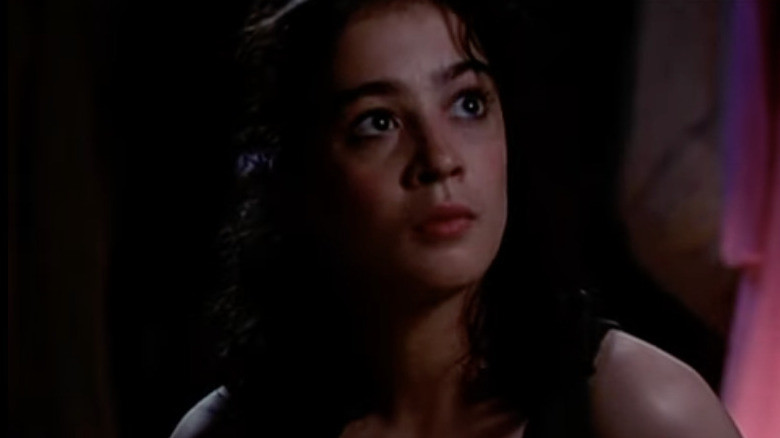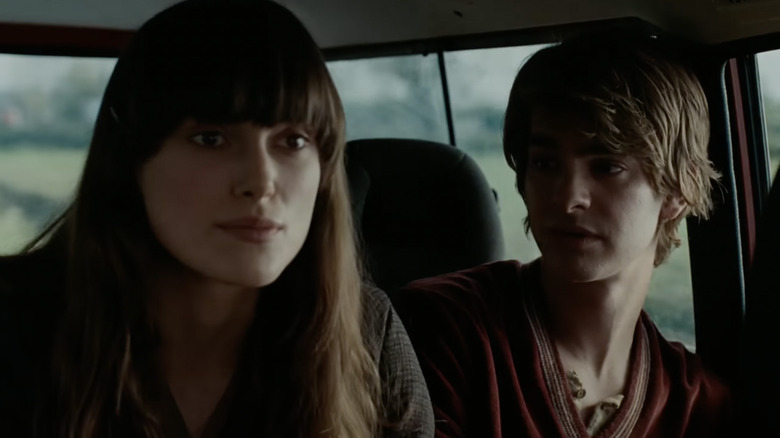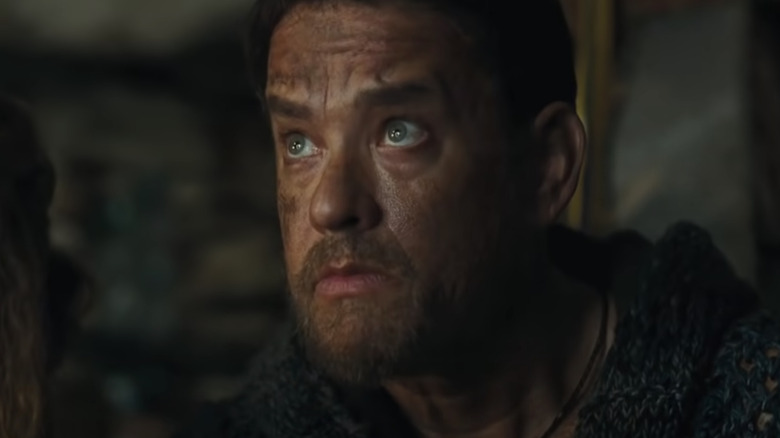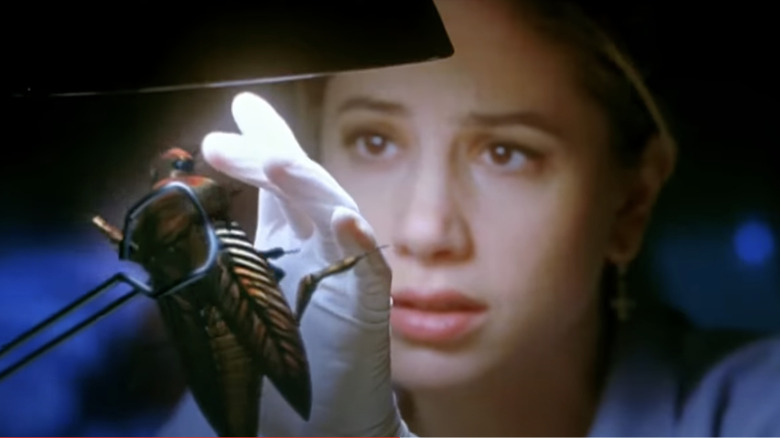Hidden Sci-Fi Gems On HBO Max You Need To Watch
The streaming services market was already quite crowded, with big dogs like Netflix, Hulu, and Amazon Video all competing for the hearts, minds, loyalty, and recurring monthly payments of millions. Then the second big wave of streamers began, in which major media conglomerates created their own platforms, populated with in-house-created content. Along with Disney Plus came Warner's HBO Max, which combines HBO's extensive programming with dozens of hit TV shows and a deep well of full-length films.
Some of those movies are a major draw for HBO Max, such as "The Wizard of Oz" and the DC Extended Universe. But just below the surface lurk plenty of other movies viewers haven't seen dozens of times, all scattered across a variety of genres. In particular, HBO Max offers a number of interesting, intriguing, and innovative science fiction movies that never really got their due. With that in mind, here's a look at some overlooked and underrated sci-fi flicks to check out on HBO Max.
Updated on January 3, 2022: HBO Max's library of movies is constantly changing, and we've updated this list to show what the streamer's best sci-fi gems currently are. From epic '80s adventures and twisted body horror to time-travel romps and alien adventures, these films showcase the sci-fi gems you'll find hidden away on HBO Max.
Time Bandits
At its very core, science fiction is weird. Aliens, space, time travel, cloning, hybrid monsters — these are not everyday things so much as they are absurd, and it's exceedingly rare that a science-fiction property admits as much to the audience and presents itself as what it is, which is a strange story set in a baffling world. "Time Bandits" is one of those movies, a sci-fi fantasy adventure directed by Terry Gilliam and co-starring his old Monty Python friends John Cleese and Michael Palin.
This "Doctor Who" meets "Bill and Ted" tale concerns 11-year-old history buff Kevin (Craig Warnock), who, after being surprised in his room one night by a group of time-traveling little people, follows them into a void that opens up in his house. Suddenly, they're all hopping through time and space together, trying to keep their time map safe from both the Supreme Being (rendered as a floating head) and the manifestation of Evil, who each desire to manipulate time for their own reasons. All the while, Kevin and friends meet heavily satirized historical and folk figures, such as Napoleon and Robin Hood. "Time Bandits" is also visually stunning, with one-of-a-kind, quaint, sometimes cheap-looking special effects.
Solaris
Not only did the Soviet Union beat the U.S. in phase one of the "space race" — getting a satellite, Sputnik, into orbit first — the former Cold War superpower was also ahead of the Americans in making quiet, haunting movies about lonely astronauts. Long before "Ad Astra," "Gravity," "Interstellar," or "The Martian," there was "Solaris," a 1972 film co-written and directed by legendary Russian filmmaker Andrei Tarkovsky and based on a book by author Stanislaw Lem.
Psychologist Kris Kelvin (Donata Banionis) heads to a troubled space station near the Earth-like planet of Solaris so as to treat the few cosmonauts that remain employed there, all of whom are experiencing increased mental instability. Not only does the crew act not quite right to Kelvin, but the station is also seemingly the home of Kelvin's long-dead wife. What could be a moody movie about listless space travelers becomes a contemplative one about the nature of memory and the state of reality itself... but in the unforgiving and cold atmosphere of a space station.
Frequently Asked Questions About Time Travel
The horror-comedy "Shaun of the Dead" is about some underachieving slacker types who stage a counterattack against zombies from their local British pub. "Frequently Asked Questions About Time Travel" is like the sci-fi version of "Shaun of the Dead," subbing out the undead with the spectacular manipulation of time. Comic actors Chris O'Dowd, Marc Wootton, and Dean Lennox Kelly portray a trio of bored, go-nowhere friends who pop into the pub for a pint one night and ultimately find themselves crossing paths with Cassie (Anna Faris), a woman whose claim that she's from the future holds weight when one of them uncovers a time hole that gives them a look into the pub in the future ... where everyone is dead, including them.
Here, the movie shifts gears and becomes a murder whodunit, only the victims themselves have to figure out who or what killed them, or rather who will kill them, if their multiple trips back and forward in time don't work out correctly. All the while, they've got to avoid alternate versions of themselves and try their best not to create those dreaded time paradoxes.
Fantastic Planet
Don't let the title befitting of a nature documentary fool you — "Fantastic Planet" is very much a science fiction movie, and one of the most engrossing, baffling, and haunting ones ever made. In the mid-20th century, the genre was dominated by works of allegory or ones that tried to uncover some truth about the human condition via stories about creatures, space, or the future. "Fantastic Planet" is that kind of sci-fi epic. This animated film from 1973 — originally released as "La Planet Sauvage," because it's in French — looks and feels like "Yellow Submarine," only more haunting.
On the alien planet Ygam, giant blue-skinned aliens called Draags have brought in earthlings (which they call Oms) to keep as pets and entertainment in their advanced society. A juvenile Draag named Tiwa rescues an abandoned human baby (after two other blue kids kill its mother), and accidentally sends the newly named Terr bursts of knowledge through his collar that crosses circuits with her headphones. When Tiwa matures into adulthood, he escapes and meets up with a tribe of free Oms whose habitat is under attack. Add in a spooky prog rock musical score, and "Fantastic Planet" is the perfect oh-so-'70s sci-fi film.
Scanners
Even if you haven't seen "Scanners," you're probably familiar with the film's most famous sequence: the pre-GIF-era image of a bald guy in a suit whose head suddenly explodes into a bloody mess. While taken totally out of context, that actually provides a very good idea of what "Scanners," written and directed by famously provocative filmmaker David Cronenberg ("Dead Ringers," "The Fly") is all about. In the world of the film there exists an ostracized subculture of "scanners," the now-adult offspring of women who took an unproven sleep aid during pregnancy; they possess the abilities to read minds, manipulate minds, and also make them explode. Darryl Revok, an especially powerful scanner, infiltrates a military company's event and blows up the head of one of their hired scanners. Darryl aims to unite scanners and take over the world, and it's up to his brother, Cameron, a reluctant scanner driven mad by his powers, to stop him. "Scanners" is rife with weird mind control sequences, exploding heads, and, of course, a telepathic battle for the ages between brothers.
Rabid
Writer-director David Cronenberg is responsible for some of the most visionary cult classics of the past 50 years, weaving science fiction and horror together to create terrifying and paranoid pieces about the unspeakable terrors and inhumanity of modern life. And long before "Scanners," "The Fly," and "eXistenZ," Cronenberg released "Rabid" in 1977, one of his first feature films ... and one of his most disturbing.
In her first mainstream movie after establishing herself as an adult film star, Marilyn Chambers plays Rose, a motorcycle enthusiast who suffers numerous injuries in an accident. She's treated by an experimental plastic surgeon who grafts on new skin and flesh, hoping it will trigger the body into healing itself. Instead, a mutated, piercing growth develops around Rose's armpit, and it's got an insatiable taste for human blood. In this body horror movie — one peppered with hints of technophobia and apocalypse paranoia — "Cronenberg tackles issues of a hypersexual society, in which bodily technology has far surpassed our moral capabilities," according to Father Son Holy Gore.
The Hitchhiker's Guide to the Galaxy
Douglas Adams' freewheeling, satirical, wildly funny outer-space epic "The Hitchhiker's Guide to the Galaxy" entered the sci-fi pantheon in 1978 as a BBC Radio series, and it's been adapted for the stage, the small screen, a five-book series, and in 2005, a standalone, star-studded feature film.
A take on the first book, "The Hitchhiker's Guide to the Galaxy" follows the adventures of Arthur Dent (Martin Freeman) — a regular English guy who discovers that road crews are about to tear down his house to expand a highway ... and then that the Earth itself is scheduled to be blown up by the interstellar Vogon race to build a space bypass. He gets that news from his friend Ford Prefect (Yasiin Bey), who reveals himself to be an alien traveling the cosmos with the aid of the pithy "Hitchhiker's Guide to the Galaxy," a space guidebook that looks like and predates an iPad.
As they sometimes literally falls and tumbles through space, Arthur and Ford align themselves with Zaphod Beeblebrox (Sam Rockwell), a two-headed rogue of a galactic president who stole the sophisticated Heart of Gold spaceship (outfitted with an "Improbability Drive" and staffed by a depressed robot named Marvin the Paranoid Android) in search of the answer to the ultimate question of "life, the universe, and everything." Manohla Dargis of The New York Times called the film "hugely likable," and David Edelstein of Slate found it "an extremely pleasant, consistently amusing diversion."
Anna to the Infinite Power
A child-friendly (but child-scaring) science-fiction staple of '80s HBO finally arrives on HBO Max. Based on the spooky young adult novel by Mildred Ames, "Anna to the Infinite Power" concerns Anna (Martha Byrne), a gifted 12-year-old who attends a school in New Jersey for the exceptionally intelligent. Sure, she's a kid genius, but she's also got a tendency to steal things, nastily talk back to her teachers, suffer from horrific headaches at the sight of fire, and is plagued with unsettling, near-apocalyptic nightmares. And soon enough, Anna comes to learn just why she's a genius and perhaps the cause of all those side effects: She's a pawn and not-quite-human experiment subject in a secret government genetic engineering program.
DVD Verdict says that the suspenseful "Anna to the Infinite Power" bridges the gap between '70s schlock and '80s Spielbergian "suburban fantasy" films while also creating "a serious sense of paranoia." And if you're in the mood for a slice of '80s creepiness ostensibly aimed at kids, this film's the one for you.
Blindness
Apocalypse movies, in all their many forms, are always a fascinating slice of science fiction. Not only do filmmakers imagine and flesh out the terrifying idea of the world coming apart due to some kind of doomsday catastrophe, but it's interesting to examine the toll such an event would have on the human psyche, regardless of the form the end of days takes.
In "Blindness," director Fernando Meirelles (best known for acclaimed dramas like "City of God," "The Constant Gardener," and "The Two Popes") presents a creepy sci-fi thriller about "white sickness," a rapidly spreading disease that robs whoever gets it of their sight. A doctor (known only as "Doctor") played by Mark Ruffalo is left blind, and he's sent to a government-run camp with his still-seeing wife (Julianne Moore), where things are falling apart as quickly as they are on the outside. It's up to her to lead the resistance while also avoiding that white sickness. "'Blindness,'" according to Namrata Joshi of Outlook, "manages to communicate the sense of deep-rooted paranoia and anxiety to its audience," which is perfect for anyone hoping to watch some unsettling sci-fi.
Daybreak
"Daybreak" is an overlooked, provocative sci-fi movie in the future dystopian mold, but it's also a time capsule, capturing a very particular moment, both in terms of the climate of Hollywood and where collective anxieties resided, unresolved.
Starring a cast of some of Hollywood's most exciting up-and-coming stars of the early 1990s (Cuba Gooding Jr., Moira Kelly, Omar Epps, Martha Plimpton), "Daybreak" is a 1993, made-for-HBO, worst-case scenario-oriented response to the first wave of the AIDS crisis, which terrified the world. In "Daybreak," a sexually transmitted infection has spread wildly and inflicted millions, particularly young adults. The fascistic government tries to put a stop to the epidemic with a forceful hand, utilizing violent gangs to gather up those believed to be infected and then quarantining them until they die.
In this horrific AIDS allegory — a look from the past at a future many feared was feasible — it's up to two rebels, Torch (Gooding) and Kelly (Blue), to unite the people in the name of empathy.
Never Let Me Go
Unfortunately, there aren't many sci-fi movies based on the work of a Nobel laureate — but that just makes "Never Let Me Go," adapted from a novel by Kazuo Ishiguro, all the more special. Dreamlike, visually exquisite, and deeply thoughtful about what it means to be a human being, "Never Let Me Go" seems like a period piece or an art movie until the viewer realizes it takes place in a hypothetical and slightly dystopian past. Kathy, Tommy, and Ruth, who are the best of friends, attend a rural British boarding school. When they leave to make their way in the world, however, they learn they're the result of a government-sponsored experiment in cloning. According to Peter Bradshaw of The Guardian, "Never Let Me Go" "has ideas; it resists categorization, and it lingers in the mind." Much of that staying power comes from its tender exploration of the human need to connect and love each other, against all odds.
Cloud Atlas
"Cloud Atlas," David Mitchell's acclaimed novel, is so dense, it seems unfilmable. But Lana and Lilly Wachowski, the dazzling visionaries who created "The Matrix" franchise, manage to capture the book's dreamy and cerebral mixture of folklore and faux-religiosity. The result: A fable-esque movie as moving and profound as it is visually startling.
"Cloud Atlas" is all about how acts of kindness (and the strength of human bonds) resonate across time and space. Recognizable actors like Tom Hanks, Halle Berry, Jim Broadbent, and Hugh Grant play roles in many different time periods, which drives home the film's point about parallel existences. In one storyline, a lawyer helps an escaped slave in 1849. In another set in 1930s England, a composer flees the past and future. In the far-off year of 2144, a manipulated clone finally feels what it means to be human. Jason Shawhan of Nashville Scene called "Cloud Atlas" a "symphony of emotion that plays the synapses and the spine." What more could a sci-fi fan ask for?
Mimic
Guillermo del Toro, the Oscar-winning visionary behind works like "The Shape of Water," "Pacific Rim," "Hellboy," and "Pan's Labyrinth" made his auspicious debut in English-language film with 1997's "Mimic." An expertly unsettling riff off 1950s B-movies featuring hyper-intelligent killer insects, "Mimic" is a chilling delight that remains unknown to many of the celebrated director's fans.
A wave of disease spread by cockroaches is killing off the kids of New York City. Entomologist Susan Tyler (Mira Sorvino) springs into action, engineering a counter-race of bugs calibrated to kill off the plague-bearing roaches. It works — but unfortunately, Tyler's "Judas" bugs evolve. What's worse, they get really good at mimicry, which makes their quest to kill off humanity all the more possible. "'Mimic' will have entomophobes in the audience yearning to bug out," said Carol Buckland of CNN, "and scare-seekers squirming in their seats." In short, it's a perfectly creepy slice of Guillermo del Toro's early filmography.
